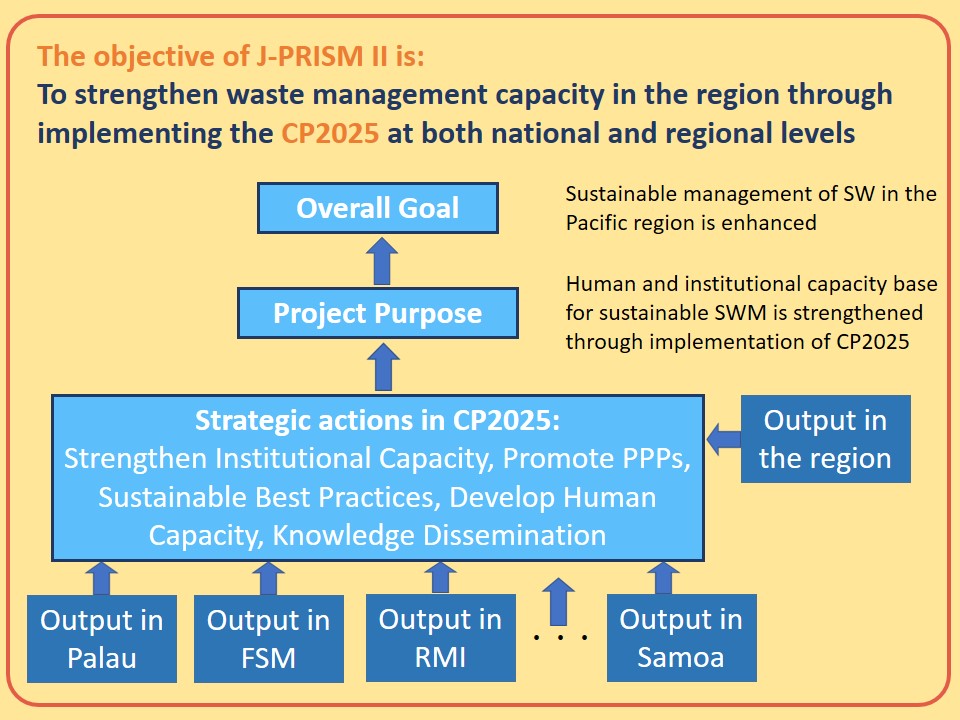J-PRISM II
Background of the project
Over several decades, waste has become one of the major concerns for small island countries in the Pacific region because of severe challenges in coping with the increasing volume and changing characteristics of urban and industrial wastes. Improper waste management has potential to pose a significant negative impact on public health, water and food supply, ecosystems, tourism and trade, resources, and even climate change, which threaten sustainable development in this region.
Such unique constraints as geographical isolation, limited resources and economic scale, and dependence on foreign aid and imported goods have made management of solid waste more difficult for Pacific island countries (PICs).
JICA/SPREP Solid Waste Initiative
In order to realize the commitment of the Government of Japan at the 2nd PALM (Japan-Pacific Leaders' Meeting) in 2000, JICA started assisting PICs in terms of solid waste management in collaboration with SPREP.
JICA/SPREP Solid Waste Initiative
- Dispatch of JICA Expert to SPREP (2000)
- Regional Training on SWM in Okinawa (2001, 2003, 2005) and Samoa (2002, 2004, 2007)
- Rehabilitation of Samoa's dumpsite (2002 - 2005)
- Regional SWM Strategy (2005, 2009)
- Bi-lateral technical cooperation Project in Palau (2005 - 2008)
- Bi-lateral technical cooperation Project in Vanuatu (2006 - 2008)
- Bi-lateral technical cooperation Project in Fiji (2008 - 2011)
- Regional SWM Project, J-PRISM assisting 11 countries in the Pacific Region (2011 - 2016)
- Regional SWM Project, J-PRISM assisting 9 countries in the Pacific Region (2017 - 2022)
Under the Pacific Regional Solid Waste Management Strategy (2016-2025) as Cleaner Pacific 2025 which has been already formulated in previous J-PRISM cooperation, JICA has conducted “Japanese Technical Cooperation Project for Promotion of Regional Initiative on Solid Waste Management, Phase II (J-PRISM II)” in partnership with the responsible agencies of the waste management of each target countries and SPREP.
Regarding previous J-PRISM project, successive technical cooperation programs contributed to raising capacity of local counterparts. They even became an essential resource person not only in their respective countries but also in the surrounding countries in the region, as experts or trainers. Also, “3R + Return” concept has been promoted during J-PRISM project. Most of the countries in the region are lacking recycling facilities and limited recycling markets in the country due to the small scale of the economy. The “3R+Return” concept would promote the proper resource recycling and appropriate disposal by exporting(returning) valuable waste or difficult waste for disposal while returning organic waste into soil for effective utilization.
To promote regional cooperation and south-south cooperation effectively and efficiently, it is expected that these human resource exchange programs would be set up as a firm system in the Pacific, not just relying on each country’s initiative/effort.
Also for the realization of “3R+Return” concept, proper organic waste treatment, effective/efficient resource recycling, and appropriate disposal, within and across the country would be significant, but it is still a continuous challenge among PICs to set up “3R+Return” system.
Under such background and circumstances, nine (9) PICs as outlined below:
Overall Goal
Sustainable management of solid waste in the Pacific region is enhanced based on Pacific Regional Waste and Pollution Management Strategy 2016-2025 (Cleaner Pacific 2025).
Project Purpose
(Integrated Project Purpose)
The human and institutional capacity base for sustainable Solid Waste Management in the Pacific Region is strengthened through the implementation of the "Cleaner Pacific 2025".
(Regional Project Purpose)
Implementation of the Cleaner Pacific 2025 on solid waste management is timely monitored and supported based on Pacific to Pacific cooperation.
Outputs of the Regional Cooperation
Output 1:
Monitoring mechanism for solid waste management in line with Cleaner Pacific 2025 is strengthened
Output 2:
Regional cooperation is organized and promoted by utilizing regional human resource and sharing good practices in the region
Output 3:
Regional capacity of disaster waste management is strengthened
Output 4:
Practical and sustainable 3R+Return system is examined
Outline of the Project
| Project Title |
Japanese Technical Cooperation Project for Promotion of Regional Initiative on Solid Waste Management in Pacific Island Countries Phase II (J-PRISM II) |
| Donor Agency |
Japan International Cooperation Agency (JICA) |
| Partner Organization |
Secretariat of the Pacific Regional Environment Programme (SPREP) |
| Period |
February 2017 – February 2022 (5 years) |
| Budget |
xxx million Yen (approx. US$ xxx million) as of August 2017 |
| Member Countries |
The Republic of Palau, Federated States of Micronesia, Republic of Marshall Islands, Independent State of Papua New Guinea, Solomon Islands, Republic of Fiji, Republic of Vanuatu, Kingdom of Tonga and Independent State of Samoa (9 countries)
|
Structure of J-PRISM II

Policy of the Project
The objective of J-PRISM is to develop/increase the capacity of the counterparts and the recipient countries as a whole through implementing strategic actions listed in the Cleaner Pacific 2025, in order to respond to any issues/challenges and provide better solid waste management. Therefore, any input provided by J-PRISM must contribute to increasing their capacity.
Pacific Climate Change Centre
In order to achieve the project goals, J-PRISM II encourages and promotes initiatives of counterparts with the assistance of JICA experts and experienced local experts/counterparts who have already acquired their skills and knowledge through JICA’s previous cooperation.
Japan’s cooperation in the field of solid waste management in the Pacific region
Creating a Sound Material-cycle Society in Small Islands
Project Office & Experts
Other Partners
ILO (Occupational Safety & Health issues)
Contacts
Mr. Mimura Satoru, Chief Advisor
E-mail: [email protected]
Mr. Faafetai Sagapolutele, Assistant Chief Advisor
E-mail: [email protected]
Ms. Ayako Yoshida, Regional Cooperation Coordinator
E-mail: [email protected]
Ms. Yoko Onuma, JICA Expert, Monitoring/3R+Return
E-mail: [email protected]
Ms. Evangeline Potifara, Project Assistant
E-mail: [email protected]
J-PRISM Project Office
c/o P.O. Box 240, Secretariat of the Pacific Regional Environment Programme (SPREP), Apia, Samoa
Telephone: (685) 21929 ext. 324